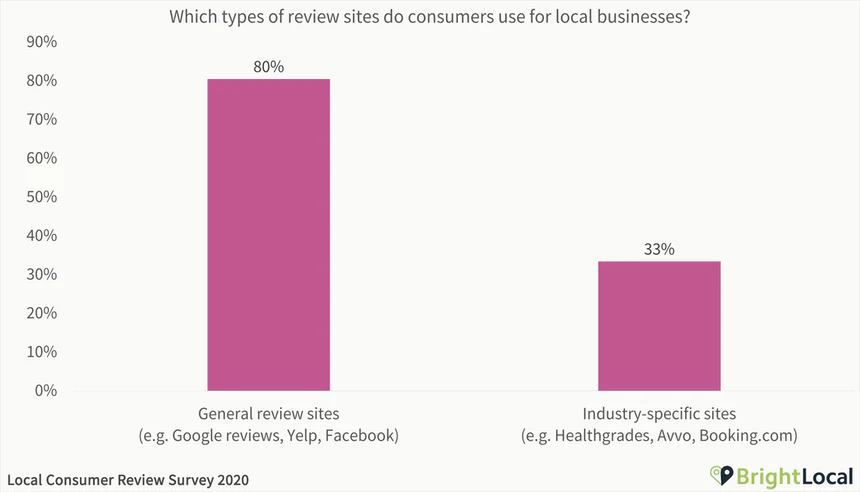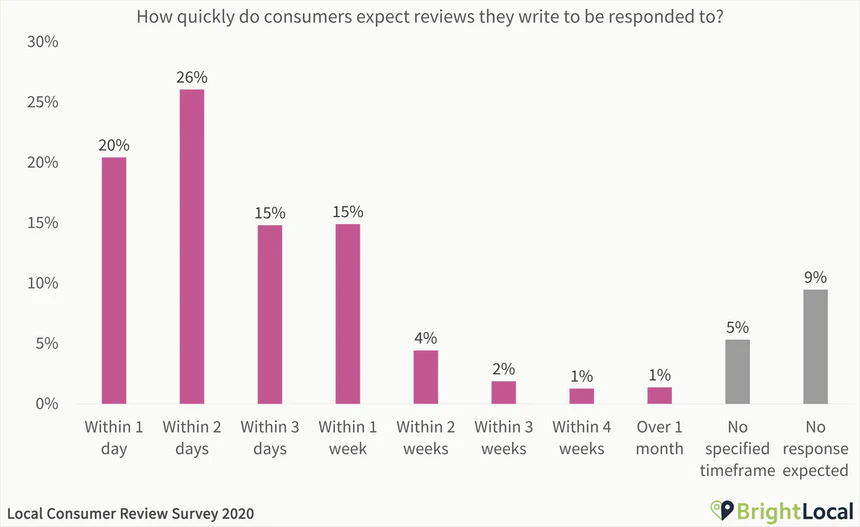Why managing reviews is important
With too many businesses claiming to offer the best products and customer service on the market, consumers are looking for ways to check their credibility. Online reviews are one such way that helps people decide in favor of a company or against them. For this reason, brands are increasingly paying attention to online review management. Here are the main benefits:
- Attract new customers. Positive reviews are useful for enhancing a brand’s online presence and improving its SEO visibility, as 31% of users will visit the business’ site after reading favorable reviews. Poor feedback, on the other hand, might turn clients away if brands don’t handle it properly.
- Increase conversions. Reviews can impact opinions, as an overwhelming majority of users (94%) are more inclined to use the services of a business if it has positive feedback from other consumers, and, for some niches, such as restaurants or hotels, it’s particularly relevant.
- Build trust with the audience. The right online reputation strategy will allow you to show clients you care about their experience and help establish trust.
- Provide feedback for your business. Based on reviews from customers, you may understand how to improve your product and drive more sales.
Managing negative and positive reviews is equally important and, below, you’ll learn why.
Why you should always reply to reviews
While it may seem that some feedback is self-sufficient, here are five reasons you should reply to every single review you receive.
- Establish authority and trust. As you gain reviews and regularly reply to them, users will see that you care about their experience and can handle various situations. Thus, they will be more likely to trust you. With a growing audience, your authority in the niche will also increase.
- Earn customer loyalty. Most review platforms notify clients when businesses respond to their reviews. This makes clients feel appreciated and more likely to become loyal customers.
- Provide SEO value. By responding to reviews, you can add more context about how your business operates and include brand-related keywords that will help increase your listing visibility in the search results.
- Protect your reputation. It takes only a couple of negative comments to start ruining your company’s reputation. However, if you take control over client feedback, these comments won’t be able to harm your business. Plus, appropriate responses to negative comments can only benefit you.
- Attract new clients. BrightLocal reveals that 40% of consumers always read companies’ responses to reviews on their services when looking for local brands. However, you should try to personalize your answers, as 70% of users will be discouraged by a templated response.
How to develop a review management strategy
With a solid online reputation management strategy in place, you will take control of all client feedback on the Internet and ensure you look credible in customers’ eyes. Here are six main steps you should take to improve reputation online.
1.Identify review platforms
As the average customer checks ten reviews before deciding to rely on the services of a company, you should identify the most popular review sites in your niche and ensure they have at least ten positive reviews of your brand. Basically, there are four types of platforms to focus on: review sites, social networks, blogs, and forums.
Review websites
These are platforms specially crafted for users to share their experience with brands across niches and help others choose only high-quality businesses and avoid frauds. Review sites can be general or industry-specific, and, to improve reputation online, brands should focus on both.

Where to find review platforms? Research by BrightLocal shows that consumers most often check the following sites: Google, Facebook, Yelp, BBB, and TripAdvisor. By claiming your page on these platforms for reviews, you’ll be able to reply to all feedback that customers leave about your business, add relevant context, and generate leads.
In addition, you need to consider industry-specific platforms. In the travel niche, these can be Booking.com, Expedia, Travelocity, Foursquare, and the like.
Social networks
Social media is where people talk and share opinions. These platforms can be a great means for establishing contact with your target audience. For example, Facebook accounts for 19% of customer reviews, so be sure to leverage Facebook Reviews among other networks.
Also, remember to monitor mentions in general, as comments may appear all over social networks. Posts tend to go viral very quickly, so you need to get a hold of what people say about your brand to maintain the right image. Here, you could use monitoring tools such as Mention, Keyhole, or TweetDeck, which will track all mentions of your brand name.
Blogs
On top of review platforms and social media, you also need to monitor blogs. Today, plenty of bloggers share reviews about products and services, and their sites receive just as much traffic as dedicated review platforms. Every niche holds a few influential blogs that can significantly change how users perceive your brand, so you need to keep an eye on them as well.
Start by identifying these key blogs and tracking what they say about you. You may also build brand awareness by writing guest posts, asking bloggers for reviews, running shoutouts, paying for promotion, etc.
Forums
Forums are another potentially beneficial source of reviews for your brand. These are spaces in which people share opinions and experience about products and services, and they can be very impactful. For instance, in the travel niche, webmasters can check forums, such as Travellerspoint, Flyertalk, Fodor’s Travel, NomadicMatt Forum, Reddit (Travel), etc. If your brand becomes a topic of interest, these forums might send you traffic, so you need to manage your reputation there.
You may also use monitoring tools to track keywords and help you keep an eye on conversations. While forums seem less public than review platforms or social networks, they might still impact your brand perception.
2.Encourage positive reviews
To increase positive online reviews, you can directly ask customers to share their opinions if they had a positive experience. Research reveals that a reassuring 72% of customers provide feedback when asked to review a product or service they used.
Be sure to facilitate the reviewing process and take away all the friction. For example, create pages for your business on major review platforms so that users can easily post feedback. Also, add a link to your listing in your email signature.
To build reviews online, contact users via email, social media, chatbot, phone, etc. Send a message like “If you had a good experience, please share it on [platform name].” A moot point here is whether to offer incentives in exchange for reviews. While giving a discount or free trial can really encourage users to share opinions, this can also make your business seem untrustworthy. Paying for fake reviews may damage your reputation even more, so try to refrain from doing so.
3.Remove false reviews when possible
Unfortunately, it is not unusual for companies to receive fake reviews from rivals, spammers, etc. If this happens, be sure to study the platform’s policies and determine whether these reviews violate them. For example, Google deletes reviews that are off-topic, offensive, do not reflect the customer’s experience, manipulate ratings in favor of or against a certain company, and so on. Should a spam comment meet one of these conditions, you can easily get it removed and maintain a healthy brand image.
4.Use the right software
Now that you’ve registered on review platforms, the next step is to set up monitoring software and track brand mentions and reviews. Make sure to choose a tool that will allow you to track all review platforms through a single interface, ask users to leave feedback, take full control over your interaction with users, add useful integrations, etc.
While there are many choices on the market, here are a few reputable online review management tools:
- Google Alerts is a simple and free tool that allows you to set up notifications for any term.
- With BrandYourself, you can get a free report on your brand’s online presence, identify potentially damaging posts or reviews, protect your private information, get a personalized action plan, and more.
- The Brand Grader is an online reputation management tool that provides a free, quick snapshot of the online performance of your brand, your competitors, or any other company. You’ll learn about mentions from influencers, web and social sources, overall sentiment, and more.
- Mention tracks over one billion sources, such as review platforms, social networks, blogs, forums, TV programs, and more. You may also publish posts on social media and get analytics. Pricing starts from $25 per month.
- Reputology is another great online review management software that helps brands monitor and analyze their online reviews. Pricing starts from $180 per month with three seats included.
- Hootsuite allows you to manage social media in a single interface and track mentions across all networks. You can start with a 30-day free trial.
5.Respond to reviews properly
All the comments you receive are an opportunity to build more trust and loyalty with your audience and even improve your offer if you take the right approach. While negative reviews may get you downhearted at first, remember that you cannot control your clients’ experience. On the other hand, a proper response can change one’s mind about your brand. In fact, Reputology found out that 80% of disgruntled clients were won over by the right reply.
How should you reply to negative feedback? Users mostly leave such reviews when they want to feel heard, so the first thing you need to do is acknowledge that and thank them for reaching out. Next, try to resolve the issue and, if necessary, take the conversation to private messages.
While positive feedback may seem self-sufficient, you still might want to respond to it, for example, by thanking reviewers. The fact that you took the time to personally reply to their comment can make users more loyal. This is even more important for the masses than particular users, as it shapes a positive image of your brand.
It isn’t only important to reply to all feedback from your customers, but also to do so in a timely fashion. For instance, 20% of users expect reviews they write to be responded to within one day, while only 15% are fine with a one week delay, as you can see in the graph below.

Furthermore, being prompt with responses is important not only for increasing customer loyalty, but also for attracting new audiences. The same study revealed that 73% of consumers only check feedback from the last month and 50% only pay attention to reviews within the last two weeks.
6.Measure the results
Once you develop a strategy of how to manage reviews online, it’s equally important to track results along the way and adjust course accordingly. If your rating and number of reviews are growing, you’re moving in the right direction. If not, you need to find and address gaps in your strategy. This can be simple with special monitoring tools that help you maintain control of all mentions and reviews in a single interface.
Another important point is to use all reviews to your benefit. Glowing comments should be used as testimonials and displayed on your homepage to attract more customers. Negative feedback is an opportunity to build trust with clients and can help improve your offer if harnessed properly.
How to create a review management strategy
With online reviews becoming vital for connecting brands to potential customers, especially since the start of the pandemic, creating an online review management strategy is especially important to maintain a brand’s healthy image. A comprehensive approach includes encouraging positive reviews, properly handling all negative feedback, removing fake reviews when possible, adding badges of trust on your site, and more. This will help you attract more customers and make your existing clients more loyal.




